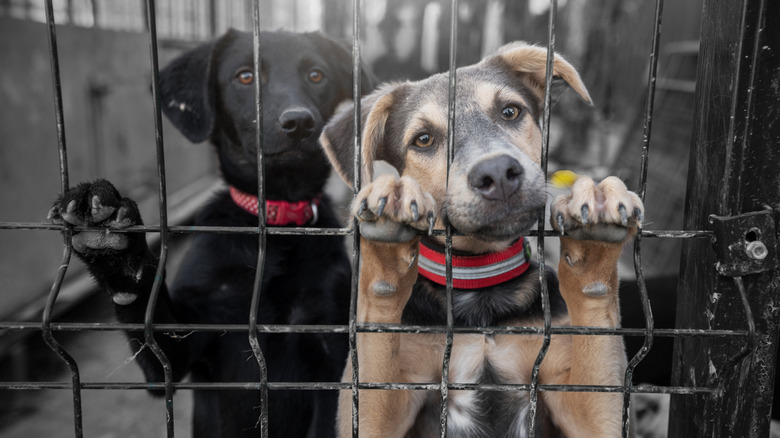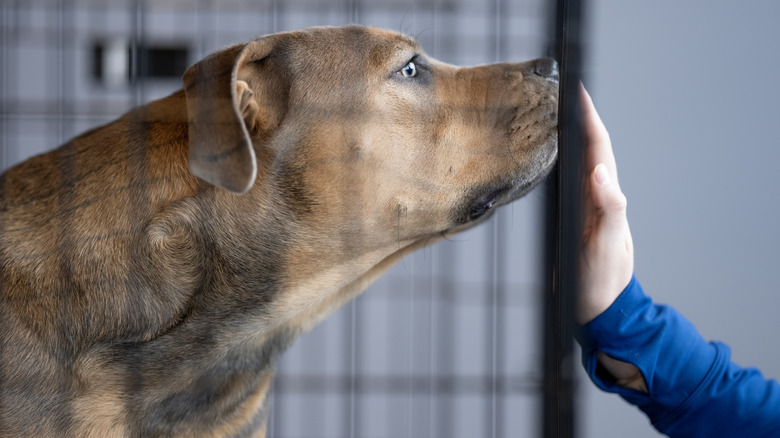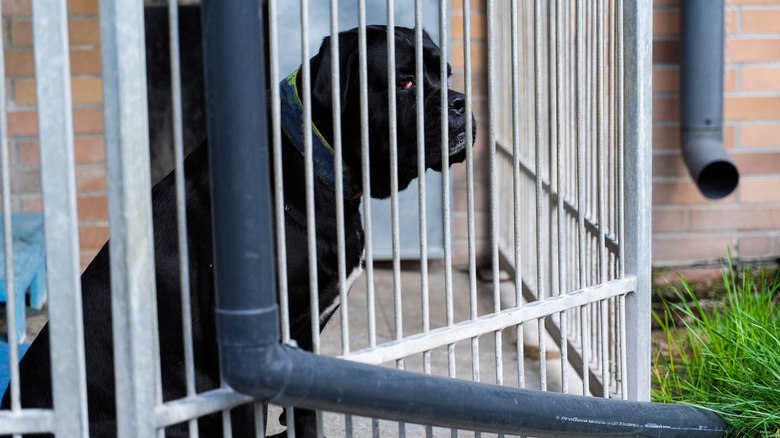What The Shelter Dogs Who Take The Longest To Adopt Tend To Have In Common
Every year, thousands of families adopt a shelter dog and give them the second chance at life they deserve. Unfortunately, though, many of those pups spend years in a shelter before being adopted, and some even receive the unwanted title of "the longest resident." So, why do certain shelter dogs find their forever homes within a few weeks while others have to wait months or even years before someone chooses them? It sadly comes down to appearance in many cases. The dogs that spend the longest at shelters are usually large breeds, have black fur, or both.
While some adopters have valid reasons for excluding dogs of medium and large breeds from their options (such as if they have a small apartment), every dog is worthy of love, regardless of size or color. All dogs should have a home with comfy bedding; plenty of toys, treats, walks, space, and affection; and hours of playtime throughout the week. Large dogs and black-coated dogs can make wonderful companions, just like any other pet, if only given the opportunity to prove it.
Smaller dogs get adopted faster than bigger ones
Large dog breeds have to wait "twice as long" to be adopted compared to smaller ones, according to The Royal Society for the Prevention of Cruelty to Animals (via Kinship). And we see this in real-life examples. Take Mia, a Dutch shepherd in England who spent more than two years at a shelter before moving into her permanent loving home. Then, there's Donatello, a pit bull mix in Kentucky who watched other dogs get adopted for four years before his turn finally came. Lastly, there's Brooklyn, a large mixed breed in New Jersey who waited more than 2,500 days for a family to call her own.
While some people may prefer large dog breeds, practical challenges can make ownership difficult for certain individuals. For example, many property managers enforce pet policies that restrict specific breeds or impose weight limits. Plus, the associated costs, like higher food bills and weight-related veterinary care, can add up quickly and be seen as a hindrance to adoption. The physical strength requirement is another factor; managing an 85-pound dog on a walk requires less effort than a 15-pound one.
Yes, big dogs tend to be more expensive and challenging in some ways than smaller ones, but they still have benefits worthy of consideration for prospective adopters. For one, they make great bedtime snugglers with their larger bodies. Large dogs also make up some of the best protective dog breeds to help pet parents feel safe; often, their size alone is enough to deter unwanted attention, whether at home or during a walk. And last but not least, if they can reach your shoulders or chest, they can make fun dance partners!
Darker-colored dogs are often passed over for lighter ones
It's a bit discriminatory when you think about it — choosing to adopt one dog over another based solely on fur color, but it happens. While many adopters won't admit it, studies prove that dogs with black coats tend to spend longer in shelters than light-colored ones. It's a phenomenon known as Black Dog Syndrome. On the adoption website Petfinder, black dogs take "almost four times as long" to get adopted than other pets.
Black dogs are sometimes seen as intimidating, especially those that are also of larger breeds, or linked to irrational superstitions or stereotypes, all of which can hinder their chances of adoption. When size plays a role in the rejection, it's referred to as Big Black Dog Syndrome. Hollywood has unfortunately fed these negative views. Black dogs (or werewolves) are occasionally portrayed as villains in films, including "The NeverEnding Story," "Dracula's Dog," and "Harry Potter and the Prisoner of Azkaban."
At the end of the day, however, black is just a color. It has no effect on a dog's behavior or aggression level. By adopting a dog with black fur, you can destroy false perceptions, especially if you post your new lovable furry family member on social media. You could also save a life. Some high-intake shelters make the heartbreaking decision to euthanize dogs that remain unadopted after a certain period (sometimes as little as two weeks) to make room for other incoming animals. This can result in black dogs being euthanized at higher rates than other dogs. Remember, big black dogs deserve a loving home, just like any other dog.


